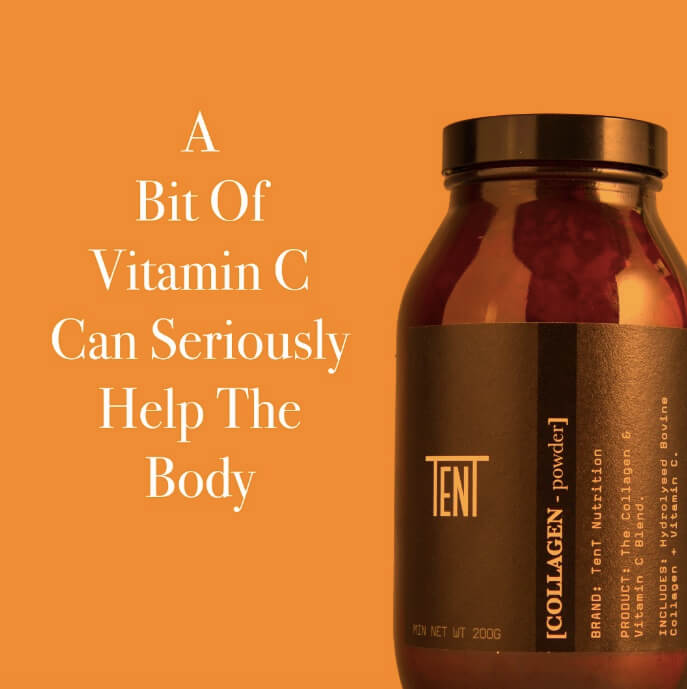
How A Bit Of Vitamin C Can Really Help
If you are like me and grew up assuming that vitamin C was just good for keeping a cold away, well it seems we were misinformed about all the benefits it has to offer.
We have put together a small list of how a bit of vitamin c can really help
Vitamin C Stimulates Collagen Synthesis
The body depends on vitamin C for the synthesis of collagen, which is found in connective tissue around the body, according to the NIH.
Adequate vitamin C levels are essential for the production of collagen. Collagen is the most abundant protein in the body and plays a critical role in connective tissues like those found in our organs and of course our hair, skin, and nails.
You may know collagen as the skin’s anti-aging saviour as some health and beauty experts portray it. A study published in September 2015 in Clinical, Cosmetic, and Investigational Dermatology found that vitamin C leads to increased collagen production and younger-looking skin. The increased collagen synthesis also means vitamin C helps wounds heal, according to Oregon State University.
Vitamin C Combined With Iron Leads to Better Absorption
Another plus to vitamin C is how it interacts with other vitamins and minerals in the body, such as iron. Iron supports proper growth and development, aids the body’s ability to deliver oxygen throughout the body, and helps make certain hormones, according to the NIH.
Nonheme iron, which is the type of iron found in plants, can be tricky for the body to absorb, but eating vitamin C (and ideally heme iron, which is commonly found in meat and seafood) at the same time as nonheme iron leads to better absorption, according to Harvard Health Publishing.
It Plays a Role in Enhanced Brain Function
Vitamin C also plays a role in neurotransmitter synthesis and cognitive function. Neurotransmitters are important for sending messages from the brain to the rest of the body, according to the University of Queensland, in Australia. And more vitamin C may be associated with increased brain function. A systematic review published in September 2017 in Nutrients found higher vitamin C concentrations in cognitively intact study participants compared with those with impaired cognition.
Its Antioxidant Properties Help Guard Against Chronic Disease
Many of the benefits of vitamin C can be traced to its antioxidant properties. Antioxidants act to neutralize free radicals, which are volatile and harmful substances produced in the body that cause damage to cells and tissues.
According to the Mayo Clinic, antioxidants can protect against the development of serious health conditions, such as cancer or heart disease.
Vitamin C Strengthens the Immune System
Perhaps vitamin C’s best-known benefit is the positive effect it has on the immune system. In a review published in November 2017 in Nutrients, vitamin C was found to support the immune system by protecting against oxidative stress, aiding in microbial killing, and decreasing the potential for tissue damage.
A deficiency in this vitamin has been shown to increase the rate of infections. It’s unlikely that loading up on vitamin C once you start sniffling will keep you from getting a cold, but it could help you recover more quickly, according to a prior review.
Vitamin C Protects the Eyes
The American Optometric Association notes that vitamin C can lower the risk of developing cataracts and can also help slow the progression of age-related macular degeneration (AMD).
Specifically, previous research has found vitamin C as part of a daily supplement slowed the progression of the disease among people with moderate AMD, likely because of its antioxidant properties.
Great for the circulation
Taking a daily supplement of vitamin C can be beneficial for healthy blood circulation – especially in patients that have type 2 diabetes, adds the source. “As a result, vitamin C may prove to be a potent combatant against diabetes-induced vascular disease,” notes diabeteshealth.com.
These diabetes-related vascular diseases can lead to complications such as retinopathy (which can lead to vision impairment and blindness), nephropathy (kidney problems), and atherosclerosis (causing excessive plaque build-up in the arteries).
For the aches and pains
Here’s a pretty good reason to consume more vitamin C, especially if you’re advancing in age and getting a lot more muscle pains than you used to, or you’ve been training for a marathon. LiveStrong explains the vitamin “may contribute to reducing and relieving sore muscles.”
In particular, they talk about the benefits related to delayed onset muscle soreness from intense exercise that shows up eight hours or more after activity.
The pain is from damaged muscle tissue, and the duration of the pain is from healing of torn muscle fibers, it adds.
---
We are very proud to offer vitamin C it as part of our skin supplement and our collagen powder – to see these products please click here
READ NEXT:
Negative self talk, why do we do it? Now lets stop it